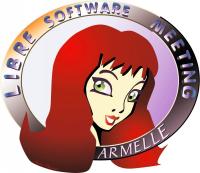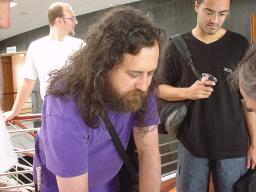 Free software developers think that copying restrictions and
software patents slow down progress.
Free software developers think that copying restrictions and
software patents slow down progress.
This article was originally published in Finnish in MikroPC magazine, issue 11/2000, 10.8.2000.
 Free software developers think that copying restrictions and
software patents slow down progress.
Free software developers think that copying restrictions and
software patents slow down progress.
The Libre Software Meeting was a four day long mix of a conference and a meeting. The aim was to share information and get people together from software projects based on voluntary work around the world. The content of the event was technical and atmosphere non-commercial. It gathered 250 software developers and enthusiasts at the premises of the University of Bordeaux in the beginning of July.
The French word "libre" - free (as in free speech) - in the name of the event was chosen on purpose. The English term "free software" is often translated as freeware although the primary idea of the GPL license, used by Linux for example, is to guarantee the freedom to use and modify the software in all ways.
The idealistic approach was also visible in organizing: the presentations were not advertisements for some companies and sponsor money came mostly from governmental or other public entities. The main organizer was the local Linux users group ABUL.
The conference consisted of about a dozen topics each of contained presentations, discussions and work. Many participants moved from room to room trying to grasp the best parts of the presentations and the most interesting conversations were during breaks and in the city restaurants in the evenings.
Most of the talks were about some specific project or the structure and functionality of a program from a technical viewpoint. Commercial aspects were not discussed very often, but questions related to law formed their own rather lively topic. The most interesting part of it was Free Software Foundation founder Richard Stallman's talk about the justification of copyright laws and their impact on the society.
Stallman reminded that the original idea of the copyright laws is to promote progress. "The principles of ethics don't change, but the changes in technology alter the consequences of decisions."
Especially prohibiting private copying restricts freedom. Depending of the type of the work certain restrictions on commercial copying can be acceptable, however not including software. Also the duration of copyright should be much shorter, maybe ten years.

|
According to Richard Stallman, the founder of Free Software
Foundation, prohibiting private copying does more harm than good. Picture: Nicolas Darnis |
Stallman classifies works in three groups. Software, textbooks and other reference works are functional and one must have the right to publish modified versions of them in addition to copying. For works that express ones views like essays distribution unmodified is enough. Aesthetic works like novels, poems, paintings and music are more difficult. On the other hand they are original creations of the authors specifically in their initial form and on the other hand someone else may produce new art by modifying them.
The new law currently being processed by the European Union that would allow software patents was the hottest single topic of discussions. Patents were seen as a threat to free software development and creativity. Small companies and voluntary projects cannot afford buying rights from patent holders or defend themselves in the cases of disputes. There didn't seem to be people present that would have supported the proposed law, so there weren't any debates on the topic.
In addition to the part aimed for developers there were public presentations dealing mainly the possibilities of free software in education. Demand proved to be high, especially the network built of old PC equipment raised interest. Several extra practical training sessions for using the software were organized on short notice.
Local activists established contacts and had negotiations about how additional training for teachers could be organized.
In France there is one additional ingredient in the soup: the newest actions of the government favor the use of free software in schools and administration.
In developing countries computers are still unreachable for most people. The zero cost of free software and functionality in older hardware make it easier to build networks. About a dozen representatives from different African countries came to meet free software developers.
As a result of the negotiations an African free software users' association was formed. The goal of the association is to promote technological co-operation between African countries and to establish contacts around the world.
In addition to the zero cost, the openness of source code of the software and the global development model open new opportunities. "All the people in all countries can be actors, not only consumers", as ABUL president Pierre Jarillon put it.
Libre Software Meeting was also a nice opportunity for local politicians to show the technical competence of the region beside the already well-known wine culture. Next summer the event will be organized again at the same place, after that the plan is to change country each year.
More information:
Home page of the event: http://lsm.abul.org
Travel report: http://www.niksula.cs.hut.fi/~ateras/travel/lsm/
Last update 28.11.2000.